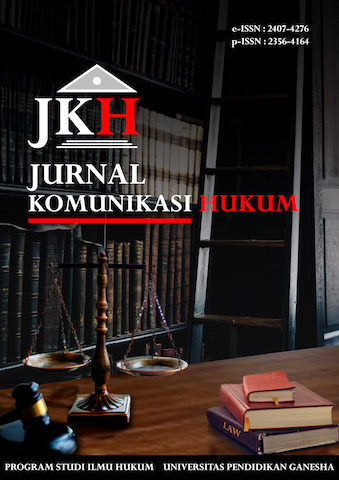ANALISIS KEADAAN TERTENTU TENTANG PENERAPAN PIDANA MATI: STUDI KASUS KORUPSI BANSOS COVID-19
DOI:
https://doi.org/10.23887/jkh.v8i2.48292Abstract
Indonesia is still ranked 96th out of the 180 most corrupt countries in the world. This is evidenced by many corruption cases that occur, such as the corruption case of embezzlement of social assistance funds for PKH members in Malang, the corruption case that ensnared the inactive West Bandung Regent Aa Umbara, and the corruption case that made former Social Minister Juliari Batubara a suspect. The phrase "certain circumstances" in Article 2 paragraph (2) of the Anti-Corruption Law raises problems. First is considered capable of providing a deterrent effect for corruptors, but on the other side the article is considered to trigger injustice. The legal issues raised are 1) The imposition of the death penalty for the perpetrators of the Covid-19 social assistance corruption crime based on Article 2 paragraph (2) of the Anti-Corruption Law. 2) Legal efforts in the sentencing process for the perpetrators of the Covid-19 social assistance corruption. This study uses socio-legal research methods. The results of this study 1) The death penalty in article 2 paragraph (2) of the Anti-Corruption Law can be imposed on perpetrators of the Covid-19 social assistance corruption. 2) One of the causes of difficulties in handling corruption cases is in terms of evidence, for this reason, the Adjudication and Non-Adjudication efforts through RALA are the right strategy to improve legal mechanisms in the process of criminalizing the perpetrators of the Covid-19 social assistance corruption. involving institutions related to the implementation of the criminal justice system.
Downloads
Published
How to Cite
Issue
Section
License
Authors who publish with this journal agree to the following terms:- Authors retain copyright and grant the journal right of first publication with the work simultaneously licensed under a Creative Commons Attribution License that allows others to share the work with an acknowledgement of the work's authorship and initial publication in this journal.
- Authors are able to enter into separate, additional contractual arrangements for the non-exclusive distribution of the journal's published version of the work (e.g., post it to an institutional repository or publish it in a book), with an acknowledgement of its initial publication in this journal.
- Authors are permitted and encouraged to post their work online (e.g., in institutional repositories or on their website) prior to and during the submission process, as it can lead to productive exchanges, as well as earlier and greater citation of published work (See The Effect of Open Access).
Authors who publish with this journal agree to the following terms:
- Authors retain copyright and grant the journal right of first publication, with the work [SPECIFY PERIOD OF TIME] after publication simultaneously licensed under aCreative Commons Attribution License that allows others to share the work with an acknowledgement of the work's authorship and initial publication in this journal.
- Authors are able to enter into separate, additional contractual arrangements for the non-exclusive distribution of the journal's published version of the work (e.g., post it to an institutional repository or publish it in a book), with an acknowledgement of its initial publication in this journal.
- Authors are permitted and encouraged to post their work online (e.g., in institutional repositories or on their website) prior to and during the submission process, as it can lead to productive exchanges, as well as earlier and greater citation of published work (See The Effect of Open Access).












